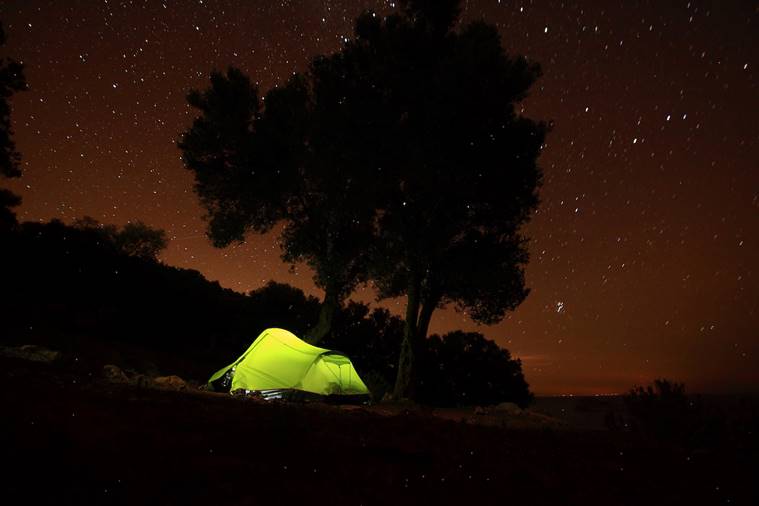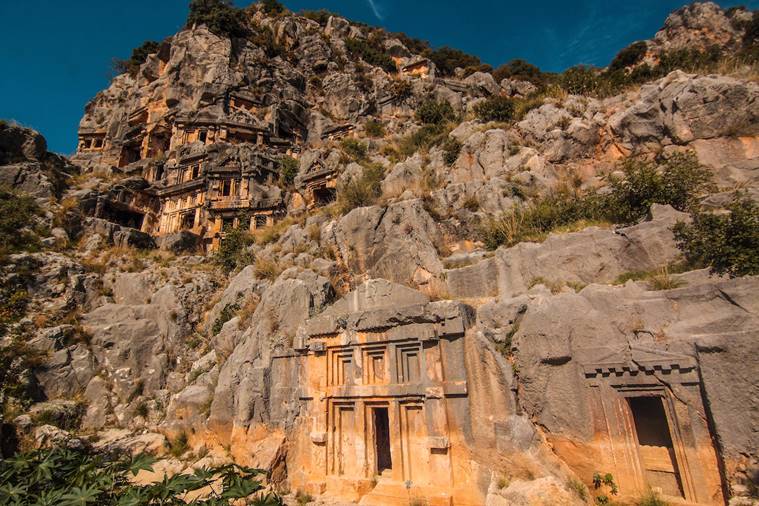Got to make the feeling last: On a hike in Turkey, what it means to explore a trail without the Internet
Every day is a foray into the unknown when you set off on a hike in Turkey, on foot and without the Internet.
 The Lycian Way in Turkey connects ancient cities, coastal towns and stretches of stunning wilderness.
The Lycian Way in Turkey connects ancient cities, coastal towns and stretches of stunning wilderness.
Two winters ago, under the light of a flashlight in our little green tent, my friend and I were peering into a guidebook. We were camped by the side of a country road in the hinterlands, outside a village called Cukurbag in southwestern Turkey. We were hiking the Lycian Way, a 500 km trail along the Anatolian coast between the cities of Fethiye and Antalya.
For the first time in months, I had also opted out of my over-reliance on technology; I’m used to travelling fast and effectively, which kills all spontaneity and margin for error. On this journey, however, by going in blind and giving it enough time, I was opening myself up to the possibility of being taken by surprise.
I had agreed to join my friend when she proposed we hike the Lycian Way in Turkey independently, without any guidance. The thought of Turkey serves up images of a grand Ottoman past but the much-earlier Roman and Hellenistic roots never captured my imagination. That was set to change. Lycian Way is an ancient path connecting many of the now-ruined but centuries-old, pre-Ottoman Lycian settlements along the Turquoise coast in southwest Turkey. What remained of those ancient cities includes massive sarcophagi in the middle of wilderness, tombs carved into sheer cliff faces and gigantic amphitheatres. The trail, essentially connecting the ruins of ancient cities like Xanthos, Patara, Myra, Simena and more, is well marked and criss-crosses secret coastal towns, small mountain villages and a whole lot of stunning wilderness.
In this adventure, thrills came in unexpected ways. Neither my friend nor I had realised that the internet couldn’t school us on what our time on Lycian Way would be like because there was so little written about it online. All we had was a bare-bones German guidebook that dealt with the logistics of the trail, more than the description of it. So, every day was a new adventure into unknown lands. We’d arrive at seaside towns we had never heard of, stay in places we couldn’t obsessively check the reviews of, marvel at 2,000-year old ruins we hadn’t been told of and see sights that weren’t dulled by the ubiquity of social media posts.
 A shepherd camping next to the ruins of an ancient church high up in the mountains, beyond the pastures of Alaklisé, came to inspect our camping set-up and invited us to have warm ekmeks (large rotis) straight off the fire, with delicious honey.
A shepherd camping next to the ruins of an ancient church high up in the mountains, beyond the pastures of Alaklisé, came to inspect our camping set-up and invited us to have warm ekmeks (large rotis) straight off the fire, with delicious honey.
Slowing down our travel to the least possible speed as we moved on foot, we had adopted a human pace of exploration. That led to encounters which wouldn’t have been possible otherwise. When a little girl rescued us from a raging thunderstorm on the afternoon of the first hiking day, we got to spend the night with a lovely family in the remote mountain village of Bezirgan. We could hardly exchange words but their kindness transcended the language barrier. A shepherd camping next to the ruins of an ancient church high up in the mountains, beyond the pastures of Alaklisé, came to inspect our camping set-up and invited us to have warm ekmeks (large rotis) straight off the fire, with delicious honey.
But the kindness of strangers was not the only happy outcome of this slow journey on foot. It was also the blessing that came in the form of limited network connectivity. As we hiked along craggy cliffs overlooking coastal delights, across pasture lands guarded by fierce shepherd dogs, and cutting through wild jungles, the lack of internet meant we had to devise ways to stay immersed in our surroundings for days together.
Hiking was meditation by another name. By concentrating on how not to miss the trail, or fall off the cliff or while soaking in the beauty of the azure Mediterranean waters spread in front of me, I inadvertently left my worries behind. Mindfulness, something that was sorely missing in my attention-deficit city living, had made an excellent, if perhaps temporary, comeback.
 Lycian Way, the trail, essentially connecting the ruins of ancient cities like Xanthos, Patara, Myra, Simena and more — includes massive sarcophagi in the middle of wilderness, tombs carved into sheer cliff faces and gigantic amphitheatres.
Lycian Way, the trail, essentially connecting the ruins of ancient cities like Xanthos, Patara, Myra, Simena and more — includes massive sarcophagi in the middle of wilderness, tombs carved into sheer cliff faces and gigantic amphitheatres.
Slowing down and spending weeks in a particular region also meant immersing ourselves in the local culture. It was a window into another way of living. Staying in small, family-run pansyions (bed and breakfasts), we got to sleep and eat like a local. We learnt their breakfast comprised a healthy spread of cheese, olives, fresh fruits and bread. That their homemade Mediterranean food was hearteningly close to Indian cuisine. We also figured this particular coast was extremely popular with German tourists, which is why every second Turkish person we met could speak fluent German. These weren’t groundbreaking discoveries but small details that made us feel like we were making a new acquaintance.
I had spent a month in Turkey and didn’t venture beyond the 300 km between Dalaman and Antalya. On any other trip, I probably would have jet-setted across the country, checking off must-visit sights from a list. But by limiting myself to a small stretch on the Lycian coast, I felt like I had been on a journey of discovery and not just a vacation.
Photos





- 01
- 02
- 03
- 04
- 05






















